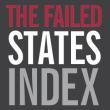
Many people are familiar with bioethics. Among those who are familiar with bioethics, some of them have heard of 'developing world bioethics', i.e. the study of bioethical problems specific to resource-poor countries. There is even a
very good journal devoted entirely to this field. But perhaps something has been left out. Some states are not just developing, or resource-poor, but regarded as failed states. So is there such a thing as failed state bioethics? What would be the role of a bioethicist in a so-called failed state? Is bioethics superfluous in such circumstances, or does it have an important role to play?
This blog is part of a project to help build capacity in bioethics and the ethics of biomedical research in the Democratic Republic of Congo. So it was hard not to take note of yesterday's release of the
2006 Failed State Index, which placed DR Congo second in the world, only surpassed (if that is the word) by Sudan. The index uses the following 12 indicators to arrive at its rankings, which (as one would expect) not everyone agrees with:
1 - Mounting Demographic Pressures
2 - Massive Movement of Refugees and IDPs
3 - Legacy of Vengeance - Seeking Group Grievance
4 - Chronic and Sustained Human Flight
5 - Uneven Economic Development along Group Lines
6 - Sharp and/or Severe Economic Decline
7 - Criminalization or Delegitimization of the State
8 - Progressive Deterioration of Public Services
9 - Widespread Violation of Human Rights
10 - Security Apparatus as "State within a State"
11 - Rise of Factionalized Elites
12 - Intervention of Other States or External Actors
There is something odd about putting out a report card on states, as if they were wayward pupils, especially in an era of globalization when the idea of nation states is supposedly becoming increasingly irrelevant. And there is little acknowledgement of how some of the better-off states that are lower down on the list have helped (and are still helping) push up other states into the higher realms of failure. But be that as it may, according to the indicators, DR Congo is a failed state if there ever was one. There's a
good book that starts from this premise.
Those living in failed states will have to create the social role of bioethics themselves. Perhaps it will involve ethical reflection on the different ways that the 12 indicators impact on health, health care, and health policy. And also health research: for just as arms dealers and mining companies are happy to do business in the Eastern Congo, pharmaceutical companies and research organizations are not at all shy to run trials in failed states.







